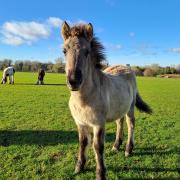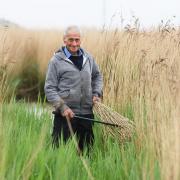Broads Authority chief executive Dr John Packman has to perform a delicate balancing act every day

John Packman is a pragmatist. He has to be. As chief executive of the Broads Authority, he's responsible for an area that contains a quarter of the most rare and important species found in the UK while, at the same time, hosts more than seven million visitors a year.
Such is the remarkable and unique beauty of this area, passions are bound to run high. There is, after all, a delicate balance to be struck between conservation, enjoyment of the area, and navigation - the three responsibilities that came with an Act of Parliament in 1988.
Dr Packman is understandably wary of interviews that can result in eye-catching, but misleading, headlines. As I thrust a national newspaper clipping in front of him with the headline 'Water war', he quickly puts me straight.
Far from a 'war' between local residents, farmers and conservationists, it's a case of all working together on what is "probably the biggest issue facing the Broads", he says.
"Predictions suggest that we're going to get wetter, warmer winters and drier, hotter summers. On top of that, climate change is making the sea rise even further, so salt water is going to come even further up our rivers.

"This is one of the most important areas for growing food in the country but it's also one of the most special places for water-dependent wildlife, so we need to find ways to hold some back for the summer. It's a long-term issue."
The Broadland Futures Initiative, in partnership with the Environment Agency, is seeking the views of everyone likely to be affected by rising sea levels, erosion and flood risk.
And with around 10 main groups with major interests in the Broads - from national nature reserves to farming, from boat hire to heritage and local planning - it's obvious Dr Packman has to advise his board members with the utmost precision to help them make the right decisions.
You might think such caution would hamper progress but far from it. The Broads Authority is promoting its status in this 70th year of National Parks by posting up dazzling images of the area to greet arrivals at Norwich Airport and at Great Yarmouth and Norwich railway stations. And roadside signs will remind visitors to the Broads they are in a National Park.

This branding is seen as hugely beneficial to an area that generates £600 million a year and supports 7,000 livelihoods. "As a member of the National Parks family, we benefit from funding and share expertise on issues such as managing sustainable tourism," says Dr Packman.
And he is rightly proud that, of the 15 National Parks, the Broads has the most biodiversity.
This is the 30th anniversary year for the Broads Authority and Dr Packman has been CEO for the past 18. Above all, he understands the power of partnerships.
"The big things for us this year are delivering on CANAPE - a major European partnership project - and Water, Mills and Marshes. We are the lead partner in CANAPE (Creating a New Approach to Peatland Ecosystems), a €5.5 million project supported by the European Regional Development Fund. We'll get about £600,000 to help with dredging and recreating a lost reedbed at Hickling Broad to benefit wildlife and navigation."

Thousands are being inspired to connect with the Broads through the £4m Water, Mills and Marshes project, supported by the National Lottery Heritage Fund to the tune of £2.4m.
"We were working last year with all the schools in Lowestoft, this year with all the schools in Yarmouth and next year the schools in Norwich," says Dr Packman. "Some children have said their visits to the Broads were the best days of their lives."
A Government review on National Parks, due to report this autumn, could present fresh challenges and opportunities. But Brexit is the cloud on the horizon.
"While CANAPE funding is secure, we will lose access to European funding pots if Britain leaves the EU. But, more importantly to me, we'll have to work even harder to maintain partnerships.
"We also buy vital equipment from Holland, so we're concerned about any additional costs or restrictions." The European Habitats Directive protects 25% of the Broads but Packman is hopeful Defra would offer the same protection post-Brexit.
"The other big issue for us is the future of farming," says Dr Packman, an issue he has raised with Environment Secretary Michael Gove. "We want to make sure support for the environmentally-friendly Halvergate grazing marshes will continue."
Keeping the Broads as a living, working environment is crucial to its future and its steady growth in visitors - around 2-3% a year. The aim is to spread visitors across the whole area, to discover the southern broads, for example.
This is a favourite spot for Dr Packman who enjoys canoeing on the River Waveney with his wife Caroline.
"The Waveney is quieter and you can see kingfishers and otters, so putting the canoe in at Beccles and going up to Geldeston Lock is one of the things we do on a regular basis."
Not all the Packmans' spare time is spent in watery pursuits.
"Caroline and I practise yoga and we bell ring at a local church which keeps my brain alert," he jokes. He will certainly need to be alert in the months ahead.



























